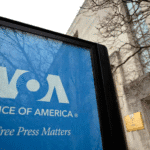United States Government Shuts Down for First Time in Six Years
The U.S. government has entered its first shutdown in nearly seven years after Congress failed to reach a last-minute agreement on a funding bill.
The deadlock, driven by a standoff between Democrats and Republicans over healthcare spending, caused the government to run out of funds at midnight.
As a result, hundreds of thousands of federal employees deemed non-essential — excluding those critical to public safety, such as law enforcement — face furloughs or layoffs.
Essential services, including Social Security payments and the postal service, will continue but may be hampered by staffing shortages. Meanwhile, national parks, museums, and other federally funded institutions are expected to shut down entirely.
A Democrat-backed proposal to keep the government running failed in the Senate by 53 votes to 47. A Republican plan later secured 55 votes but fell short of the 60 votes required to avert the shutdown.
Unlike legislation, a simple majority isn’t enough to pass a government funding bill.
Following the votes in Washington DC on Tuesday night, the White House’s budget office confirmed the shutdown would happen and said affected agencies “should now execute their plans”.
It blamed the Democrats, describing their position as “untenable”. The opposition party wants to reverse cuts to the government’s health insurance programme, Medicaid, which were passed earlier this summer.
Senate majority leader John Thune, a Republican, accused the Democrats of taking federal workers “hostage”.
His Democrat counterpart, Senate minority leader Chuck Schumer, said the Republicans’ funding package “does absolutely nothing to solve the biggest health care crisis in America”.
President Donald Trump has threatened mass firings and the cutting of some federal benefits that he said were important to Democrats.
He blamed Democrats for the standoff and threatened to carry out mass firings of government employees and cut government programmes and services that he says are important to Democrats if a shutdown occurred.
“The last thing we want to do is shut it down, but a lot of good can come down from shutdowns,” he said on Tuesday. “We can get rid of a lot of things that we didn’t want, and they’d be Democrat things.”
Trump met Schumer on Monday, but they failed to break the deadlock with the Democrat saying afterwards that “large differences” remain.
The president also said that if a deal was not struck “we can do things during the shutdown that are irreversible, that are bad for them”. The White House has suggested a shutdown could prompt permanent firings of federal staff deemed “non-essential”.
“We’ll be laying off a lot of people,” Trump said.



